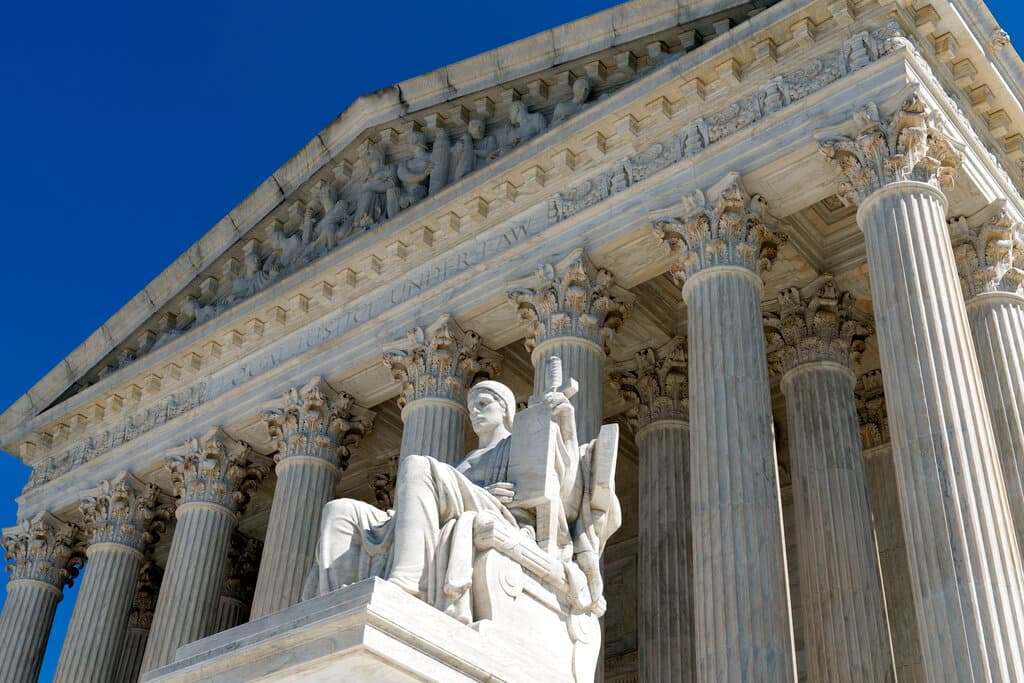Renewed Push for Accountability in Courts, Justice Department
No American ought to doubt that the federal legal system is executing its duty with disinterested impartiality.

As citizens lose confidence in federal courts and law enforcement, a push is building to allow for the removal of judges and attorneys general who peek around Lady Justice’s blindfold and put their fingers on her scales by creating a legal mechanism short of impeachment.
Only one attorney general, Harry M. Daugherty in 1922, has been the target of successful impeachment proceedings. He resigned, but was later found not guilty. Just 15 federal judges have been impeached, with the Senate convicting eight. Since the American system relies on checks and balances, it’s up to Congress to create them when the people demand it.
“We have to fear federal law enforcement,” the radio and television host, Mark Levin — who served as chief of staff to President Reagan’s attorney general, Edwin Meese — said in a recent commentary, “in specific, the United States Department of Justice and the FBI, which is a piece of the Department of Justice.”
Attorneys general who oversee these agencies, Mr. Levin said, “should be subjected to removal by a no-confidence vote of Congress,” noting that it’s almost impossible to impeach one. Since the office was created by Congress not the Constitution — as was the DOJ in 1870 — the legislature can, however, alter the terms of employment when the people demand it.
A September survey by the Society of Presidential Pollsters at George Washington University suggested that 57 percent of voters said “the Supreme Court is working,” an eight-point drop since 2020. Approval of the Department of Justice and FBI saw respective declines of four and six points.
“Confidence in federal courts,” the National Center for State Courts wrote last month, “dropped from 60 percent in 2021 to 57 percent in 2022,” while confidence in the Supreme Court fell 10 points in that same period. Just 53 percent of the registered voters surveyed believe it’s impartial.
Mr. Levin also proposed term limits for federal judges. This remedy would require a constitutional amendment or convention of states, but is something a House Democratic bill proposed for Supreme Court justices last year, calling it a move to “restore legitimacy and independence to the nation’s highest court.”
These are bipartisan concerns. In 2016, the left railed against the FBI director, James Comey, giving an election-eve press briefing on Secretary Clinton. “A slim majority of voters,” GWU wrote, “claim federal law enforcement agencies have become politically weaponized.”
Attorney General Merrick Garland became a martyr to the left after the Republican Senate refused to take up his Supreme Court nomination by President Obama, casting his impartiality into question. The FBI raid on President Trump’s home had the right crying foul against him, as have the Twitter Files documenting federal collusion with Big Tech to suppress speech.
Mr. Trump’s nominations to fill three high court seats, including the one that would’ve been Mr. Garland’s, sparked similar anger, including an assassination attempt against Justice Kavanaugh. In response to these events, President Biden considered — and his commission rejected — adding to the Nine in support of the slogan “Equal Justice for All” over the Supreme Court’s entrance. Last year, House Republicans introduced a resolution calling for Mr. Garland’s impeachment.
The court-packing scheme and impeachment push have about as much chance of success as fictional district attorney Hamilton Burger of “Perry Mason,” who lost every case to the titular lawyer. However, William Talman, who played Burger on television, didn’t view court as a gunfight, offering a reminder of the law’s higher calling.
“Burger doesn’t lose,” Mr. Talman told the Pasadena Independent Star-News in 1958. “Like any real-life district attorney, justice is Burger’s main interest,” and it wouldn’t have been served by sending innocent people to jail. This faithful implementation of the law remains the sacred mandate of law enforcement, fictional or not.
No American ought to doubt that the federal legal system is executing its duty with disinterested impartiality. The first step to stopping the erosion of confidence is to recognize the problem; the second is to consider and implement changes to ensure “equal justice for all” aren’t just words chiseled in stone.

